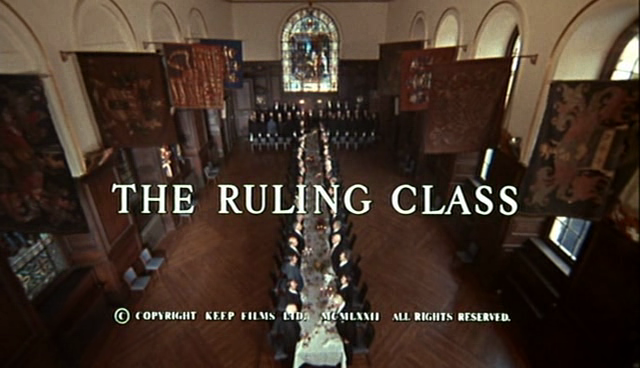Appropriately enough for what feels very much like a Monty
Python member’s first solo album, Graham Chapman’s The Odd Job was released via
a division of the Charisma record company (famous for prog legends Van Der
Graaf Generator and Genesis). It’s an odd blend of mainstream sit-com and black
comedy featuring David Jason playing Ronnie Barker… or at least the kind of
character his hero and mentor specialised in.
Chapman originally wrote the story as part of a series of
half hour TV comedy one-offs for Ronnie Barker in 1971 and here revived the idea as a full length
feature directed with aplomb by Peter Medak (who also directed The Ruling Class) and including Mr Janson in a reprise of the titular role.
 |
| Graham Chapman and Diana Quick |
He stars as civil servant Arthur Harris who comes home to
his well-upholstered flat to find that his marriage has gone sour. His wife
Fiona (Diana Quick) is packing to leave and surprised by his early return,
reveals the frustrations of years that led her to this moment. She’s bored and
repressed – they have taken each other for granted, they shout but no longer talk...
 |
| The future national treasure in action |
Fiona walks out leaving Arthur devastated
with just enough time to throw his wife’s pot plant out of the window much to
the surprise of his attractive neighbour Angie (Carolyn Seymour) four storeys
below. Distraught, Arthur can only think of ending it all and there
follows a sequence of half-hearted attempts culminating in a failed
electrocution: he can’t quite reach the switch. A knock on the door reveals a
funny little man in a leather coat, motorbike head gear and horn-rimmed
spectacles (Janson) asking if there are any odd jobs…
Arthur asks if this would include switching on the light for
his suicide but this doesn’t really work out. But it turns out that the
mild-mannered jack of all trades is actually a master of murder and he agrees
to “hit” Arthur: to take him by surprise as he goes about his daily life and to
put him out of his misery.
Meanwhile Fiona has gone to their friend Tony Sloane (Simon
Williams) for refuge but, spurning Tony’s advances, soon realises she has made a
mistake and still loves Arthur.
 |
| Diana Quick |
Meanwhile Arthur faces an offer of his own as Angie invites
him in for a drink which quickly advances to a more substantial offer and yet,
somehow, Arthur resists the temptation leaving Angie alone with her cuddly toy dog…
 |
| Carolyn Seymour and Graham Chapman |
So, love is not lost for the Harris’ and there is soon
reconciliation as Fiona brings her bags back home. But, there’s still a
problem: the Odd Job Man has been set to kill and Arthur has no way of
contacting him to call the job off.
There follows much calamity as the Man makes various
unsuccessful attempts to complete his contract only for Arthur to narrowly
escape either through luck or judgement. Collateral damage includes the
caretaker (George Innes) been poisoned by cyanide-laced milk, a group of old
ladies on a pleasure cruise being machine gunned, a policeman drowned driving Arthur's sabotaged Rover and the odd gangster or two being
blown up in the toilets.
  |
| The ex-Caretaker and Arthur's Rover |
The Police get involved in the form of Inspector Black (Edward
Hardwicke) and Sergeant Mull (a young Bill Paterson) along with a host of
British character actors as events career towards the seemingly inevitable
outcomes. But Chapman has an underlying message about love and life that
doesn’t allow for easy outcomes…
Dusty verdict: A
likeable comedy with good performances, notably from Quick and Chapman who
makes you forget to anticipate the Pythonesque whiplash (“He’s not the Messiah;
he’s a very naughty boy…” etc).
Excellent support from Simon Williams as the conflicted best
friend as well as Carolyn Seymour with her cuddly toy.
Then there’s that David Jason chap as the odd, Odd Job Man:
whatever became of him?
The Odd Job
doesn’t appear to be available on DVD anywhere so I’m stuck with the old VHS.
Catch it if you can and don't forget to love the one you’re with…









.png)
+Jack+2.png)

+JC.png)



+uncle.png)




+Lords+3.png)
+Lords+2.png)


+wedding+balloons.png)
.png)
+saucy+3.png)
+Accused.png)
+hunting+song.png)
+Jack.png)
+jump.png)
.png)
.png)
.png)